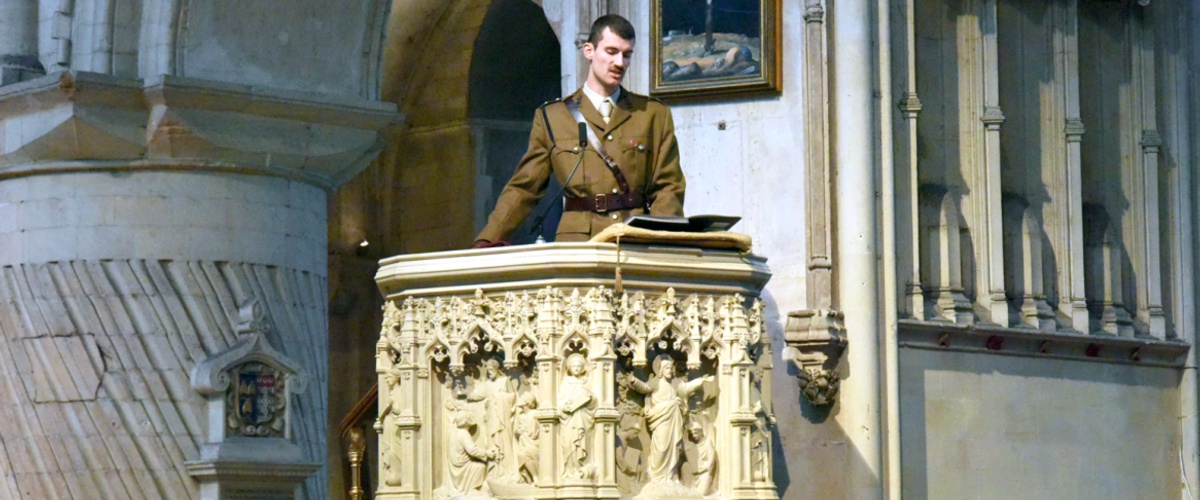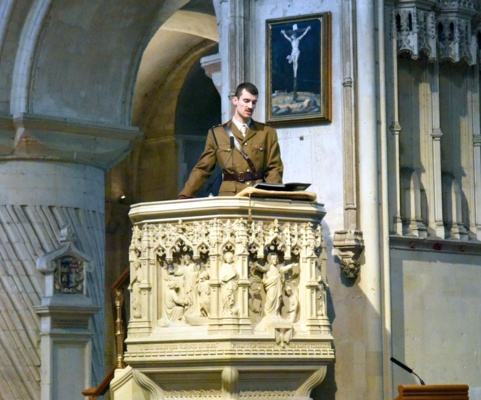In the last two centuries, Great Britain has been involved in over 20 major wars, taking and losing life on every continent. In this time, Britain’s military and the wars in which it has been involved have changed markedly, from the line infantry battles of the Napoleonic Wars, to the horrific trench warfare of World War One, to the counterinsurgency of today. To keep pace with these advancements, so too, has our military’s training had to change, particularly for those officers charged with leading British troops in combat. Since World War Two, this training has been conducted at the Royal Military Academy Sandhurst, of which notable alumni include many members of the Royal Family, notable politicians such as Winston Churchill, and international representatives from almost 130 nations.
Training at Sandhurst is intended to take an individual with no prior military experience to a level sufficient for them to take on their first command position. My cousin, with a few years of prior service behind him, entered the Academy with a head start – but for most, 80% of whom are recent university graduates, the learning curve is steep, and the competition intense. Not to mention for the international cadets who not only have to learn an entirely new military structure but often have to do so in a second language.
That being said, many rise to the challenge, such as Sam. Sam was one of the brightest young officers his nation had, and he had been selected for training at Sandhurst in order to develop his command abilities further. A member of my cousin’s platoon, Sam was consistently at the front of the pack, fiercely intelligent, immensely fit, and always keen to learn. Whether it was rain, sleet, snow, mud, late nights or early mornings, Sam always performed, and his enthusiasm never faltered.
That was until, with just over a month until his training was concluded, something changed. Sam stopped engaging, started staring into the distance during lectures, and began falling behind on runs. He could no longer be found in the library, nor the cafeteria, and when located the most anyone could get out of him was a few words before he would retire to his room. Even on the day of their graduation, one which all cadets remember fondly and with pride, Sam stayed behind only to congratulate a handful of his peers and, as the bell struck and their training was officially concluded, Sam was nowhere to be seen.
The following day, my cousin returned home to celebrate his achievement with his friends and family. Sam, too, returned home, but not to celebration. As an officer of Ukraine’s Armed Forces, he was returning home to war, and he had a job to do.
My name is Harry Peachment, Old Norvicensian of the Class of 2019, Durham University student, and a Lieutenant in the UK’s Army Reserve. It is an honour to be asked to speak to you here today.
My journey to understanding the importance of remembrance started where you are sitting now; proudly wearing the poppy my mum gave me a pound for, too shy to sing the national anthem, listening to the names of fallen ONs as they were read out and trying, struggling, to imagine myself in their place.
Even as I grew older, and the age difference between myself and those fallen alumni grew ever shorter, I still struggled to identify with them. This changed for me when, in 2018, the Centenary of the Armistice of World War One, I was given the opportunity to travel to Northern France with the 8th Norwich Sea Scouts. We were conducting a cycling expedition through the Somme and Picardie regions of France, stopping at many of the historic sites of the Western Front. In doing so we located and honoured the names of 18 ONs, which you will hear shortly, who fell in the First World War.
I cannot possibly impress upon you the scale of what we saw, but to give you an indication, Thiepval Memorial, where Second Lieutenant Charles Skelton ON is honoured, holds over 72,000 names of British and South African servicemen with no known graves. Nearby, Neuville St Vaast, a German memorial, holds 400,000 names – so many in fact that, even with headstones stretching as far as the eye can see, each must bear 4 names. Notre Dame De Lorette, the largest French Military Cemetery in the world with 40000 buried, has a circular installation of brass panels, approximately the size of a tennis court. On them are inscribed the names of 576000 servicepeople from all nations who fell within just that region alone, listed alphabetically – one of our group, surname Brown, found four whole panels bearing his name, totalling close to 5000 lost.
Returning to Norwich, and sitting again where you are now, brought a new meaning to those names, knowing that just weeks prior I had stood before them written in stone at their final resting places. For the first time, in some small way, I felt a connection to them, and having seen the scale of the sacrifice to which they belong, my understanding and my respect grew.
This experience stayed with me until, 3 years later, I was sat in the Royal Memorial Chapel at Sandhurst for the final service before my cohort’s commissioning parade. The walls of the chapel are embossed with the Coats of Arms for every British Army regiment, existing or historical, under which are the names of officers from each regiment who have died since their foundation. For the soon-to-commission officers sat in those pews and looking up at those plaques, it was poignant to think that, should the worst come to pass, we would be honoured on those same walls, an inspiration yet a solemn reminder of commitment and sacrifice to come.
Among those honoured: Lieutenant Colonel Derek Seagrim, Victoria Cross, of the Green Howards, and his brother, Major Hugh Seagrim, George Cross, of the 19th Hyderabad Regiment; both ONs and distinguished servicemen. Seagrim House, of which I was a proud member, was established in their name during my time at the school, and finding myself beginning to follow in their footsteps into military service came with a humbling realisation.
At last, I felt that connection strengthen. It wasn’t until later, when my cousin recounted to me the story of Sam, and I tried to imagine what he must have felt sitting in that service, that I realised something else.
In remembering the past, or aspiring for the future, we must not remain blind to the present.
We remember the two world wars for a number of reasons, but chief amongst these are the scale of their sacrifice and their existential nature; Millions dead, countless injured, every rung of society impacted. For Britain, there has been no equivalent since, and in today’s world, with its unprecedented globalisation and global cooperation, at a time when conflict can be more aptly settled by the pen and not the sword, it may seem there never again will be.
Yet, throughout the world, war and conflict rages on. Those of you in the audience this time two years ago will have heard the speaker, Retired Wing Commander Steve Dean, give the frightening statistic that in the now 78 years since the end of the Second World War, there have been just two years where a British serviceperson has not been killed in action. It is safe to say that for Steve, and for those whom he served alongside during his 11 operational tours of duty, war is not something one forgets readily – for many, it has left them irrevocably marked.
Many societies understand the horrors and consequences of war because, for these societies, war has never truly ended. Without the need for poppies or silence, it is a part of them. National service, conscription, armed borders and martial law – for millions around the globe, this is their waking reality, one that we as a society have been fortunate to shed. The battlefields of Ukraine hold an ominous resemblance to the trench warfare of World War One and, no doubt, the sentiments of those involved are very much the same.
We are fortunate in this country that we no longer have to fight for our very way of life, that we have strong alliances which safeguard us, and that should we ever again be involved in a major war, it will not be one of our survival, but in support of those same allies in the struggle for world peace. We will never fight alone, and that alone is a privilege.
I do not expect you to follow my journey into the military but, with or without the uniform, each of you will be impacted by conflict in some way. The last ON to have fallen in conflict was not a soldier or officer, but an oil and gas worker, Sebastian John, who was killed in Algeria in 2013. Whether as a journalist, lawyer or politician, an aide worker, or a simple traveller, all of you will come in to contact with war or those affected by it. Some of you will go on to study alongside students from Israel or Palestine, Iraq or Afghanistan. Many of you have already welcomed Ukrainian students into your classes, some of you into your homes.
We remember the two world wars, because it is imperative that we remember what it means for a society’s very existence to be under threat. We must each work to understand this so that we may better understand the plights of others who’s reality remains defined by bloodshed. For Sam and many others, the importance of remembrance lies not in their past or their future, but now.
When you go home, turn on the news and say, for a better tomorrow, they give their today.


